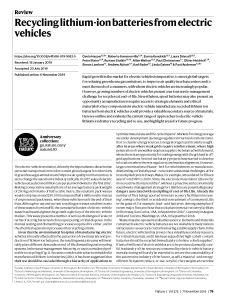
Read or listen offline
Recommendation
The burgeoning electric vehicle industry already provides some relief to conservationists concerned about global warming, but dealing with their end-of-life batteries presents significant challenges. Processes for recycling spent lithium-ion batteries are being refined to extract their valuable raw components, or make them available for second use in power grids. To maximize this technology, the authors of this detailed article suggest that manufacturers must design more efficient, standardized batteries that are simpler and less hazardous to produce, re-use and recycle.
Take-Aways
About the Authors
Gavin Harper is a Faraday Institution Research Fellow at the University of Birmingham and responsible for the development of the Birmingham Energy Institute. Paul Anderson is a reader in inorganic and materials chemistry and leader of the Materials Chemistry Research Theme in the School of Chemistry at the University of Birmingham.



















Comment on this summary or Diskussion beginnen